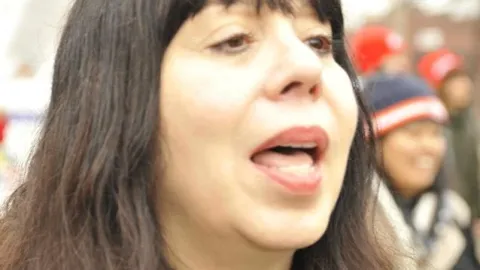A testimony of anti-immigrant harassment and a cry for protection in Chicago
The Lincoln United Methodist Church in Pilsen has offered refuge to persons in risk of deportation, and has been the target of xenophobic attacks

Emma Lozano, activist and pastor of the Lincoln United Methodist Church in the Chicago Pilsen neighborhood. (Courtesy) Crédito: Cortesía

CHICAGO – “ICE always looks for ways on how to make arrests, raids, and detentions because they say that by federal law they have the power to do so,” said Emma Lozano, activist and pastor of the Lincoln United Methodist Church in the Pilsen neighborhood.
Lozano believes the City “should have an ordinance to punish [local] authorities if they help or cooperate with ICE agents.”
The Welcoming City and Accountability on Communication and Transparency (ACT) ordinances offer important protections for immigrants in Chicago, but due to their exceptions, local authorities can still collaborate with ICE in criminal cases.
She added that cities and states need to make autonomous laws to protect undocumented immigrants and ensure they are not deported. “Now that the federal government is not protecting us and is attacking us under the Trump administration, we must have laws at the local and state levels to defend them [the undocumented],” said the activist, whose church has given support and refuge to immigrants at risk of deportation.
Besides, there have been cases in Chicago, for example, of anti-immigrant groups harassing organizations protecting the undocumented.
Lozano said she currently senses a strong anti-immigrant climate. “Our church was under attack: President Donald Trump’s [white supremacist] supporters came to my church to attack us, saying that I am organizing the invasion of this country, that I am anti-American, a communist, pure lies.”
“The atmosphere is bad because we live in a Mexican community, Pilsen, and Trump supporters came here bravely and were not afraid to break our door and attack one of my volunteers,” Lozano added in an interview with La Raza. The incidents against her church happened in September and October of 2019.
In a statement to La Raza, Lightfoot’s Office said that “Mayor Lightfoot has been, and will continue to be, a staunch advocate for immigrant and refugee communities by reinforcing Chicago’s role as a sanctuary city. She condemns any action that threatens the safety and security of Chicago residents.”
Legal aid
When asked about the operation of the Chicago Mayor’s Office of New Americans, which provides legal assistance to immigrants, Lozano considers it effective, and that it operates to the extent of their budgeting possibilities.
“It works within reach of what they can do. But they didn’t add an adequate budget suitable for the situation. It’s like a drop in a bucket of aid when it’s a national crisis. We are talking about thousands of people who are experiencing this crisis, and there are not enough places where they can get help. The only way to solve this crisis is by changing the law,” Lozano said.
According to a statement from Mayor Lightfoot to La Raza, the city allocated an additional $250,000 to the Chicago Legal Protection Fund, an increase of about 20 percent, to provide legal aid to immigrants.
That statement explained that “a key tenant to being a sanctuary city includes ensuring that the City offers accessible tools for immigrants to build successful lives in Chicago. The Office of New Americans provides these tools to help immigrants establish a stable, healthy life in Chicago. In addition to enforcing all immigrant and refugee protections, the Office of New Americans is planning initiatives, policies, and programs that will help fold immigrants into the city. This includes increasing language access, working with immigrant entrepreneurs, diminishing barriers to higher education, and working on other forms of protection that are needed in immigrant communities.”
****
The ‘Lens On Lightfoot’ project is a collaboration of seven Chicago newsrooms examining the first year of Mayor Lori Lightfoot’s administration. Partners are the BGA, Block Club Chicago, Chalkbeat Chicago, The Chicago Reporter, The Daily Line, La Raza and The TRiiBE. It is managed by the Institute for Nonprofit News.
The editorial production of La Raza is made possible in part thanks to the support of the Field Foundation of Illinois and other Initiatives. We appreciate their help.





